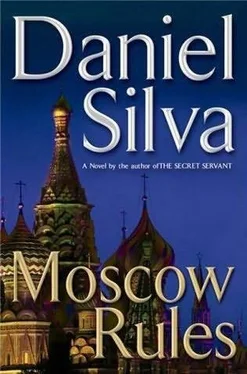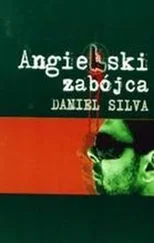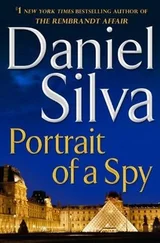It was shortly after seven when Philippe finally collected Monsieur Lubin’s bags from storage and loaded them onto the lift. Arriving at Room 237, he found the DO NOT DISTURB sign hanging from the latch. In accordance with the conventions of Plan B, he gave the door three thunderous knocks. Receiving no reply, he drew his passkey from his pocket and entered, just far enough to see two size-twelve Russian loafers hanging a few inches off the end the bed. He left the bags in the entrance hall and returned to the lobby, where he delivered a report of his findings to Ricardo.
"Passed out drunk.”
The Spaniard glanced at his watch. “It’s early, even for a Russian. What now?”
“We’ll let him sleep it off. In the morning, when he’s good and hungover, we’ll initiate Phase Two.”
The Spaniard smiled. No guest had ever survived Phase Two. Phase Two was always fatal.
The Villa dei Fiori, a thousand-acre estate in the rolling hills between the Tiber and Nera rivers, had been a possession of the Gasparri family since the days when Umbria was still ruled by the popes. There was a large and lucrative cattle operation and an equestrian center that bred some of the finest jumpers in all of Italy. There were pigs no one ate and a flock of goats kept solely for entertainment value. There were khaki-colored fields of hay, hillsides ablaze with sunflowers, olive groves that produced some of Umbria ’s best oil, and a small vineyard that contributed several hundred pounds of grapes each year to the local cooperative. On the highest part of the land lay a swath of untamed woods where it was not safe to walk because of the wild boar. Scattered round the estate were shrines to the Madonna, and, at an intersection of three dusty gravel roads, stood an imposing wood-carved crucifix. Everywhere, there were dogs: a quartet of hounds that roamed the pastures, devouring fox and rabbit, and a pair of neurotic terriers that patrolled the perimeter of the stables with the fervor of holy warriors.
The villa itself stood at the southern edge of the property and was reached by a long gravel drive lined with towering umbrella pine. In the eleventh century, it had been a monastery. There was still a small chapel, and, in the walled interior courtyard, the remains of an oven where the brothers had baked their daily bread. The doors to the courtyard were fashioned of heavy wood and iron and looked as though they had been built to withstand pagan assault. At the base of the house was a large swimming pool, and adjacent to the pool was a trellised garden where rosemary and lavender grew along walls of Etruscan stone.
Count Gasparri, a faded Italian nobleman with close ties to the Vatican, did not rent the villa; nor did he make a habit of lending it to friends and relatives, which was why the staff were surprised by the news that they would be playing host to a long-term guest. “His name is Alessio Vianelli,” the count informed Margherita, the housekeeper, by telephone from his office in Rome. “He’s working on a special project for the Holy Father. You’re not to disturb him. You’re not to talk to him. But, most important, you are not to tell a soul he’s there. As far as you’re concerned, this man is a nonperson. He does not exist.”
“And where shall I put this nonperson?” asked Margherita.
“In the master suite, overlooking the swimming pool. And remove everything from the drawing room, including the paintings and the tapestries. He plans to use it as his work space.”
“Everything?”
“ Every thing.”
“Will Anna be cooking for him?”
“I’ve offered her services, but, as yet, have received no answer.”
“Will he be having any guests?”
“It is not outside the realm of possibility.”
“What time should we expect him?”
“He refuses to say. He’s rather vague, our Signore Vianelli.”
As it turned out, he arrived in the dead of night-sometime after three, according to Margherita, who was in her room above the chapel at the time and woke with the sound of his car. She glimpsed him briefly as he stole across the courtyard in the moonlight, a dark-haired man, thin as a rail, with a duffel bag in one hand and a Maglite torch in the other. He used the torch to read the note she had left at the entrance of the villa, then slipped inside with the air of a thief stealing into his own home. A moment later, a light came on in the master bedroom, and she could see him prowling restlessly about, as though looking for a lost object. He appeared briefly in the window, and, for several tense seconds, they gazed at each other across the courtyard. Then he gave her a single soldierly nod and drew the shutters closed with an emphatic thump.
They greeted each other properly the next morning at breakfast. After an exchange of polite but cool pleasantries, he said he had come to the Villa dei Fiori for the purposes of work. Once that work began, he explained, noise and interruptions were to be kept to a minimum, though he neglected to say precisely what sort of work he would be doing or how they would know whether it had commenced. He then forbade Margherita to enter his rooms under any circumstances and informed a devastated Anna he would be seeing to his own meals. When recounting the details of the meeting for the rest of the staff, Margherita described his demeanor as “standoffish.” Anna, who took an instant loathing to him, was far less charitable in her depiction. “Unbearably rude,” she said. “The sooner he’s gone, the better.”
His life quickly acquired a strict routine. After a spartan breakfast of espresso and dry toast, he would set out on a long forced march around the estate. At first, he snapped at the dogs when they followed him, but eventually he seemed resigned to their company. He walked through the olive groves and the sunflowers and even ventured into the woods. When Carlos pleaded with him to carry a shotgun because of the wild boar, he calmly assured Carlos that he could look after himself.
After his walk, he would spend a few moments tending to his quartersand laundry, then prepare a light lunch-usually a bit of bread and local cheese, pasta with canned tomato sauce if he was feeling particularly adventurous. Then, after a vigorous swim in the pool, he would settle in the garden with a bottle of Orvieto and a stack of books about Italian painters. His car, a battered Volkswagen Passat, gathered a thick layer of dust, for not once did he set foot outside the estate. Anna went to market for him, resentfully filling her basket with the air of a virtuoso forced to play a child’s simple tune. Once, she tried to slip a few local delights past his defenses, but the next morning, when she arrived for work, the food was waiting for her on the kitchen counter, along with a note explaining that she had left these things in his refrigerator by mistake. The handwriting was exquisite.
As the days ground gloriously past, the nonperson called Alessio Vianelli, and the nature of his mysterious work on behalf of the Holy Father, became something of an obsession for the staff of the Villa dei Fiori. Margherita, a temperamental soul herself, thought him a missionary recently returned from some hostile region of the world. Anna suspected a fallen priest who had been cast into Umbrian exile, but then Anna was inclined to see the worst in him. Isabella, the ethereal half Swede who oversaw the horse operation, believed him to be a recluse theologian at work on an important Church document. Carlos, the Argentine cowboy who tended the cattle, reckoned he was an agent of Vatican intelligence. To support this theory, he cited the nature of Signore Vianelli’s Italian, which, while fluent, was tinged with a faint accent that spoke of many years in foreign lands. And then there were the eyes, which were an unnerving shade of emerald green. “Take a look into them, if you dare,” Carlos said. “He has the eyes of a man who knows death.”
Читать дальше












